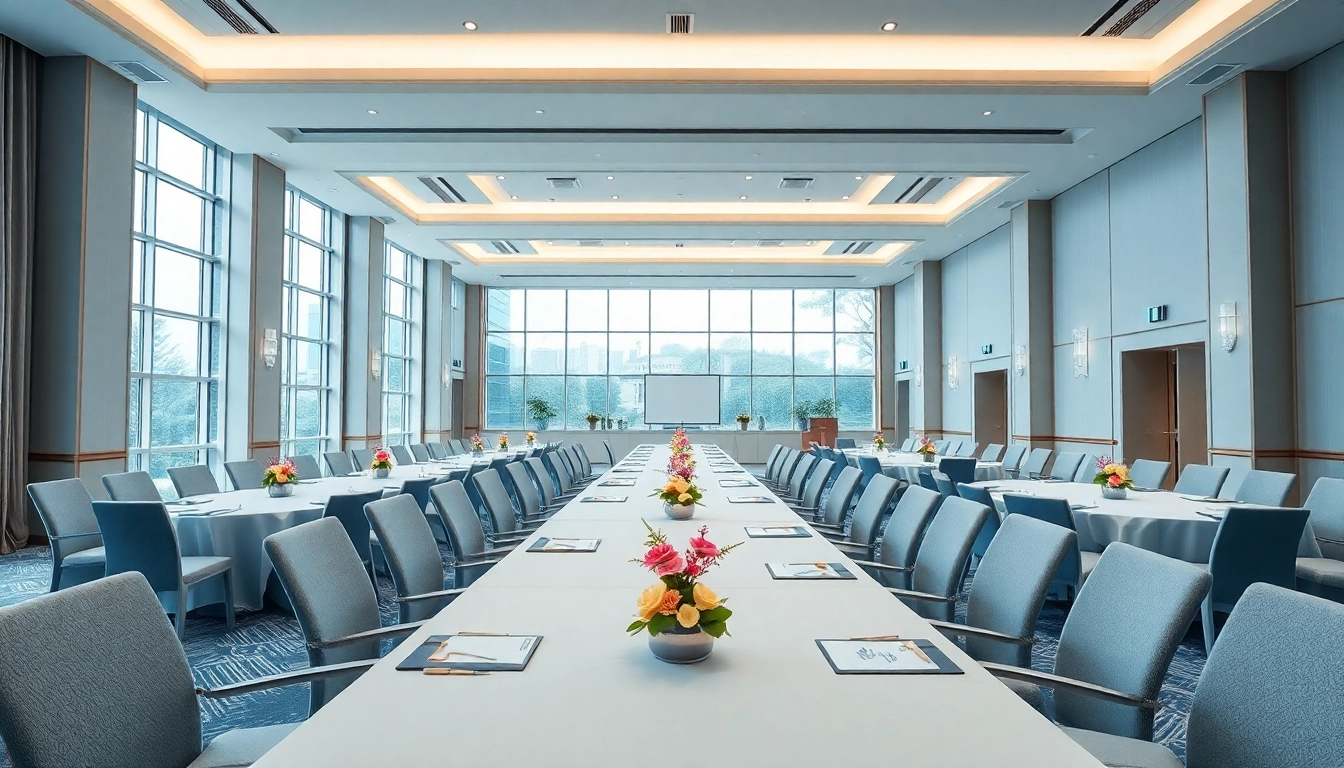Understanding Your Event Needs
Choosing the right venue is a critical step in planning an event, whether it’s a corporate meeting, a wedding, or a community gathering. To make the best choice, you’ll need to understand your event’s unique requirements. This includes identifying the type of event, assessing guest capacity, and defining the ideal ambiance. This comprehensive guide will dive deep into these aspects, ensuring you secure an exceptional event space that meets your needs.
Identifying the Type of Event
The first step in finding the perfect event space is to determine what type of event you are hosting. Different events come with varying requirements regarding layout, amenities, and atmosphere. Here are a few common types:
- Corporate Meetings: These often require a professional setting with presentation capabilities and breakout rooms.
- Weddings: Couples typically seek picturesque venues that resonate with their personal style and provide essential services.
- Conferences: Large gatherings necessitate ample space, multiple rooms, and essential technical support.
- Social Gatherings: Parties or reunions need flexible spaces for both casual mingling and organized activities.
Understanding the event type will guide your search for an appropriate event space that accommodates specific needs effectively.
Assessing Guest Capacity
The number of attendees will significantly influence your choice of venue. You want to ensure there is enough space for everyone to be comfortable without feeling cramped. Here are some considerations:
- Minimum and maximum capacity: Check for venues that clearly state their capacity limits. This will help avoid renting a space that’s too small or excessively large.
- Seating arrangements: Think about how you want guests to be seated, whether in rounds for dinner, theater style for presentations, or a more relaxed standing arrangement.
- Comfort factors: Consider the general flow and comfort for guests, including access to amenities like bathrooms and exits.
Assessing guest capacity and preferences will enhance the overall experience and facilitate better interactions among attendees.
Defining the Ideal Ambiance
The ambiance of an event space sets the tone for the occasion. Defining the desired atmosphere involves several key factors:
- Lighting: Natural light versus artificial lighting can significantly alter the feel of the space.
- Decor Style: Ensure the venue matches the desired decor style; for instance, a formal event may require elegant finishes, while a casual gathering can work in a more laid-back environment.
- Acoustics: For larger events, consider how sound carries in the space, especially if elements like music or presentations are involved.
By pinpointing the desired ambiance, you pave the way for creating memorable experiences tailored to your guests.
Key Features of an Ideal Event Space
An ideal event space is more than just a building; it encompasses various features that enhance the overall experience for attendees and organizers alike. Below are key elements to consider:
Location and Accessibility
The location of your event space plays a fundamental role in the convenience and attractiveness of your event. Here are points to think about:
- Proximity: Choose a location that is easily accessible, preferably near major transportation hubs.
- Parking: Ensure there is adequate parking or accessible public transportation options for guests.
- Surrounding Environment: Consider the surrounding area; nearby restaurants or attractions can add value for attendees who may extend their visit.
A well-located venue boosts attendance and enhances guest satisfaction.
Amenities and Services Offered
The amenities available within an event space can make or break an event’s success. Look for the following:
- Technology: Check for the availability of necessary audio-visual equipment, Wi-Fi, and other tech essentials.
- Catering Options: Explore if the venue has in-house catering services or partnerships with reliable caterers.
- Furniture and Decor: Determine what furniture is included in the rental — tables, chairs, linens, etc. — to avoid additional costs.
The right amenities ensure a seamless event experience without excessive logistical concerns.
Layout Flexibility
The ability to modify the space layout according to your needs can enhance the flow of your event:
- Open Spaces: Look for venues that offer open areas that can be reconfigured for different activities.
- Room Dividers: When dealing with larger groups, consider spaces that allow the use of dividers for smaller sessions or workshops.
- Breakout Areas: Additional spaces for informal discussions or networking can add tremendous value.
A flexible layout can accommodate changes on the fly and enhance engagement among guests, depending on your event’s needs.
Best Practices for Event Space Booking
Once you’ve assessed your needs and identified suitable venues, it’s time to navigate the booking process strategically. Here are essential practices:
Timing and Availability Considerations
Choosing the right date and time for your event impacts attendance and overall success:
- Booking in Advance: Secure your venue well ahead of your event date to ensure availability, especially for peak seasons.
- Checking for Conflicts: Be aware of local events that could conflict with your date, possibly impacting attendance.
- Time of Day: The time of day can influence the type of event; for example, morning events may work better for business meetings.
Advance planning safeguards your event against unforeseen obstacles.
Negotiating Rental Agreements
Effective negotiation can minimize costs and clarify terms:
- Understanding Terms: Scrutinize the rental agreement for clarity on included services, cancellation policies, and payment schedules.
- Rental Costs: Discuss what’s included in the price; sometimes, bundled services can provide significant savings.
- Deposit Requirements: Know upfront what is needed in terms of deposits and what is returnable post-event.
Clear negotiations build a solid foundation for your event’s success and avoid potential disputes later.
Understanding Included Services
Before finalizing your venue, ensure you understand all included services that add value to your booking:
- Catering: Know what catering services are available and what restrictions exist.
- Event Coordination: Some venues offer on-site coordination to assist with day-of logistics.
- Security and Staffing: Be sure to clarify what security services are provided and staff assistance for setup and teardown.
By fully understanding included services, you can avoid unexpected costs and ensure a smoother event experience.
Maximizing Value for Your Event Space
Setting Up for Success
Effective event setup can create an engaging atmosphere that encourages participation and interaction. Consider the following:
- Layout Planning: Create a layout that encourages flow and interaction among guests, considering their needs.
- Signage: Use clear signage for directions and information to help attendees navigate the space easily.
- Accessibility: Ensure all areas are accessible to facilitate guest movement and comfort.
A well-organized setup enhances the overall guest experience and increases engagement during the event.
Effective Use of Space
Utilizing the venue to its full potential can enhance guest experiences:
- Utilizing Breakout Spaces: Designate areas for smaller discussions or activities to keep engagement high.
- Encouraging Networking: Create comfort zones that invite attendees to mingle and network.
- Dynamic Activities: Introduce interactive elements or activities that encourage participation and maximize the use of space.
By optimizing how the space is used, you enhance the value of the event and create more memorable experiences.
Leveraging Technology in Event Spaces
Technology can facilitate engagement and streamline operations:
- Audio-Visual Equipment: Ensure reliable technology is available, including projectors, screens, and sound systems.
- Event Apps: Consider using event apps for real-time updates and attendee engagement.
- Live Streaming: For larger audiences or hybrid events, explore live streaming options to expand reach.
Incorporating technology can enhance attendee experience and ensure smooth event operations.
Case Studies of Successful Events
Examining real-world examples of successful events can provide valuable insights into best practices:
Corporate Meetings
In a corporate setting, a well-planned meeting at a suitable event space can lead to productive discussions and collaboration. Companies often utilize breakout areas for smaller discussions and feedback sessions within an open floor plan. A local tech company hosted a product launch where they used a multi-room setup, allowing teams to rotate through distinct presentation zones, optimizing their time and engagement.
Weddings and Social Gatherings
For social events like weddings, the aesthetics and ambiance of the space are crucial. One couple curated a beautiful outdoor space with a tent, string lights, and floral arrangements that reflected their personalities. By planning an open floor layout for the reception, they encouraged guests to mingle and participate in various activities, contributing to an unforgettable experience.
Public Events and Exhibitions
Public exhibitions benefit from carefully designed spaces that facilitate flow and engagement. A local arts fair featured a flexible layout that allowed for interactive booths and performances. By promoting local artists and using technology for live streaming performances, they attracted broader audiences and stimulated community involvement.
In conclusion, finding the right event space is a multifaceted process that encompasses understanding your needs, key features of venues, best practices in booking, maximizing value, and learning from successful case studies. By applying the insights from this guide, you can confidently secure an ideal event space that aligns perfectly with your objectives, ensuring a successful gathering. Whether you’re organizing a conference, wedding, or social event, thorough planning, strategic execution, and attending to detail will lead to memorable experiences for all attendees.



